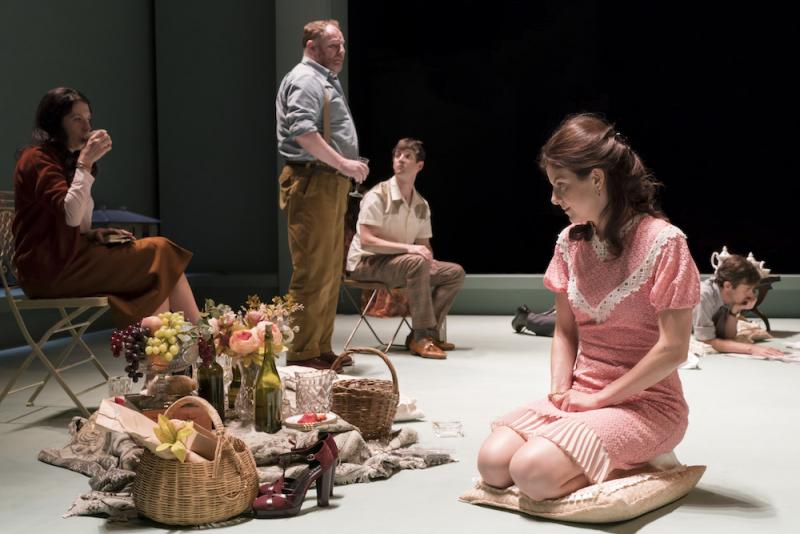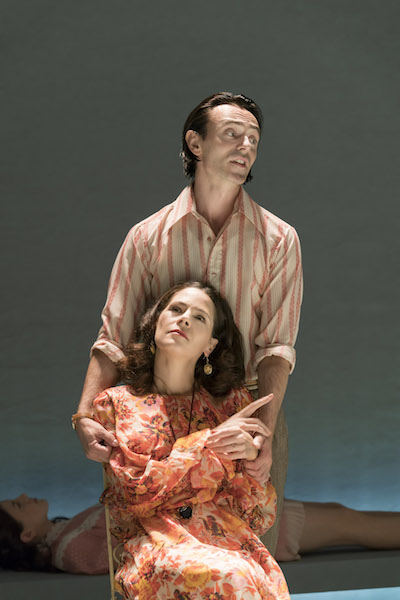Aristocrats, Donmar Warehouse review - fresh but uneven | reviews, news & interviews
Aristocrats, Donmar Warehouse review - fresh but uneven
Aristocrats, Donmar Warehouse review - fresh but uneven
Anti-naturalistic revival of Brian Friel's elegiac tribute to the Catholic nobility is oddly unemotional

Chekhovian is a rather over-used word when it comes to describing some of the late Brian Friel's best work, but you can see why it might apply to Aristocrats, his 1979 play which premiered at the Abbey Theatre in Dublin before becoming a contemporary classic. You can count off the elements that remind you of the Russia master: decaying estates, feckless toffs, wistful longings and missed opportunities.
In Aristocrats Friel offers a portrait of the O'Donnells, a decayed family who were once important Irish Catholic nobles in Donegal. Yet they could never be comfortably part of the country's ruling elite because they weren't Protestants, and never really part of the local community because of their class. This double alienation is written into their family history. Now, in the mid-1970s, with the imminent death of their patriarch, this long line of well-born judges is coming to an end. Set in Ballybeg Hall, which overlooks the village of Ballybeg (the Friel-land of the playwright's other work), the story concerns the dying man's children.
Friel creates a powerful image of a brutally patriarchal father
The unmarried Judith, who has remained at home while her siblings Anna, Alice and Casimir have left, attends her father's deathbed while making preparations for the marriage of the young stay-at-home Claire, who is a manic depressive, to a much older man. Now returned for the first time in 11 years, the Hamburg-based Casimir is full of memories of the family's history, while his tape recordings include a comically unseasonal message from Anna, who works as a nun in Zambia. Other present family members include old Uncle George and Eamon (married to Alice, who has a drink problem). Observing and recording their awkward interactions is Tom, an American academic, and local man Willie.
Friel creates a powerful image of a brutally patriarchal father, who despite his dementia still manages to dominate his children by means of a baby monitor. Casimir, his only son, has been very damaged, and has turned into a "peculiar" eccentric, a failure and a fantasist. With an absent mother, who may have been driven to suicide by her autocratic husband, the daughters try, with various degrees of desperation, to keep things together. As various fantasies of home clash with historical reality, expressed by Tom, the idea of home as a safe place in one's memory, especially after one has left it, is strongly articulated. And, of course, this family is a metaphor for the Irish nation.
Just as 1970s Ireland is affected by the Troubles, so the play contains pointed mentions of what is happening in Northern Ireland, with brief snippets, such as the fact that Judith once participated in the Battle of Bogside, offering a contrast between past activism and current stasis. Given that the Big House in this play belongs to an ancient Catholic family in a country where 95% of these properties were inhabited by Anglo-Irish Protestants, you can see that the piece is pretty much an elegy for a forgotten class. At the same time, the inability of all of the family members to cast off the past, which haunts them rather like a childhood psychological trauma, says something about the way that, before the Celtic Tiger years, many perceived Ireland as a country that was stuck in the gloom of history.
 Director Lyndsey Turner is clearly impatient with the tradition of playing this melancholy drama as a tribute to Chekhov, and her production is thoroughly anti-naturalistic, as is Es Devlin's bare, sunken and pastel-coloured set. So Friel’s printed stage directions are read out at the start of each of the three acts, a model doll's house stands in for realistic staging (honey, I shrunk the set) and the blank wallpaper of the background is gently ripped away to reveal a fresco which symbolically depicts the split family, while simultaneously being a pastiche of European art. But, despite the freshness of her approach, a kind of pensive minimalism, Turner's cast never really master the delicate music of Friel's text, and the performances are uneven.
Director Lyndsey Turner is clearly impatient with the tradition of playing this melancholy drama as a tribute to Chekhov, and her production is thoroughly anti-naturalistic, as is Es Devlin's bare, sunken and pastel-coloured set. So Friel’s printed stage directions are read out at the start of each of the three acts, a model doll's house stands in for realistic staging (honey, I shrunk the set) and the blank wallpaper of the background is gently ripped away to reveal a fresco which symbolically depicts the split family, while simultaneously being a pastiche of European art. But, despite the freshness of her approach, a kind of pensive minimalism, Turner's cast never really master the delicate music of Friel's text, and the performances are uneven.
Perhaps the most energetic presence is that of David Dawson's eccentric Casimir (pictured above with Elaine Cassidy), whose gawky and rather fey delivery is frequently both amusing and just a touch tragic in his expression of his character's illusions. Although she has relatively few speeches, Eileen Walsh impresses with her well-grounded sincerity and fragility as Judith, while Aisling Loftus (Claire) and Elaine Cassidy (Alice) are different enough to suggest a dysfunctional family. Emmet Kirwan's Eamon is less gripping than David Ganly's Willie, while Paul Higgins's American accent seems to fade in and out as if in imitation of the baby monitor. But Turner's anti-naturalistic approach results in an oddly unemotional, disjointed and not entirely satisfying production.
rating
Share this article
The future of Arts Journalism
You can stop theartsdesk.com closing!
We urgently need financing to survive. Our fundraising drive has thus far raised £49,000 but we need to reach £100,000 or we will be forced to close. Please contribute here: https://gofund.me/c3f6033d
And if you can forward this information to anyone who might assist, we’d be grateful.

Subscribe to theartsdesk.com
Thank you for continuing to read our work on theartsdesk.com. For unlimited access to every article in its entirety, including our archive of more than 15,000 pieces, we're asking for £5 per month or £40 per year. We feel it's a very good deal, and hope you do too.
To take a subscription now simply click here.
And if you're looking for that extra gift for a friend or family member, why not treat them to a theartsdesk.com gift subscription?
more Theatre
 Ragdoll, Jermyn Street Theatre review - compelling and emotionally truthful
Katherine Moar returns with a Patty Hearst-inspired follow up to her debut hit 'Farm Hall'
Ragdoll, Jermyn Street Theatre review - compelling and emotionally truthful
Katherine Moar returns with a Patty Hearst-inspired follow up to her debut hit 'Farm Hall'
 Troilus and Cressida, Globe Theatre review - a 'problem play' with added problems
Raucous and carnivalesque, but also ugly and incomprehensible
Troilus and Cressida, Globe Theatre review - a 'problem play' with added problems
Raucous and carnivalesque, but also ugly and incomprehensible
 Clarkston, Trafalgar Theatre review - two lads on a road to nowhere
Netflix star, Joe Locke, is the selling point of a production that needs one
Clarkston, Trafalgar Theatre review - two lads on a road to nowhere
Netflix star, Joe Locke, is the selling point of a production that needs one
 Ghost Stories, Peacock Theatre review - spirited staging but short on scares
Impressive spectacle saves an ageing show in an unsuitable venue
Ghost Stories, Peacock Theatre review - spirited staging but short on scares
Impressive spectacle saves an ageing show in an unsuitable venue
 Hamlet, National Theatre review - turning tragedy to comedy is no joke
Hiran Abeyeskera’s childlike prince falls flat in a mixed production
Hamlet, National Theatre review - turning tragedy to comedy is no joke
Hiran Abeyeskera’s childlike prince falls flat in a mixed production
 Rohtko, Barbican review - postmodern meditation on fake and authentic art is less than the sum of its parts
Łukasz Twarkowski's production dazzles without illuminating
Rohtko, Barbican review - postmodern meditation on fake and authentic art is less than the sum of its parts
Łukasz Twarkowski's production dazzles without illuminating
 Lee, Park Theatre review - Lee Krasner looks back on her life as an artist
Informative and interesting, the play's format limits its potential
Lee, Park Theatre review - Lee Krasner looks back on her life as an artist
Informative and interesting, the play's format limits its potential
 Measure for Measure, RSC, Stratford review - 'problem play' has no problem with relevance
Shakespeare, in this adaptation, is at his most perceptive
Measure for Measure, RSC, Stratford review - 'problem play' has no problem with relevance
Shakespeare, in this adaptation, is at his most perceptive
 The Importance of Being Earnest, Noël Coward Theatre review - dazzling and delightful queer fest
West End transfer of National Theatre hit stars Stephen Fry and Olly Alexander
The Importance of Being Earnest, Noël Coward Theatre review - dazzling and delightful queer fest
West End transfer of National Theatre hit stars Stephen Fry and Olly Alexander
 Get Down Tonight, Charing Cross Theatre review - glitz and hits from the 70s
If you love the songs of KC and the Sunshine Band, Please Do Go!
Get Down Tonight, Charing Cross Theatre review - glitz and hits from the 70s
If you love the songs of KC and the Sunshine Band, Please Do Go!
 Punch, Apollo Theatre review - powerful play about the strength of redemption
James Graham's play transfixes the audience at every stage
Punch, Apollo Theatre review - powerful play about the strength of redemption
James Graham's play transfixes the audience at every stage
 The Billionaire Inside Your Head, Hampstead Theatre review - a map of a man with OCD
Will Lord's promising debut burdens a fine cast with too much dialogue
The Billionaire Inside Your Head, Hampstead Theatre review - a map of a man with OCD
Will Lord's promising debut burdens a fine cast with too much dialogue

Add comment